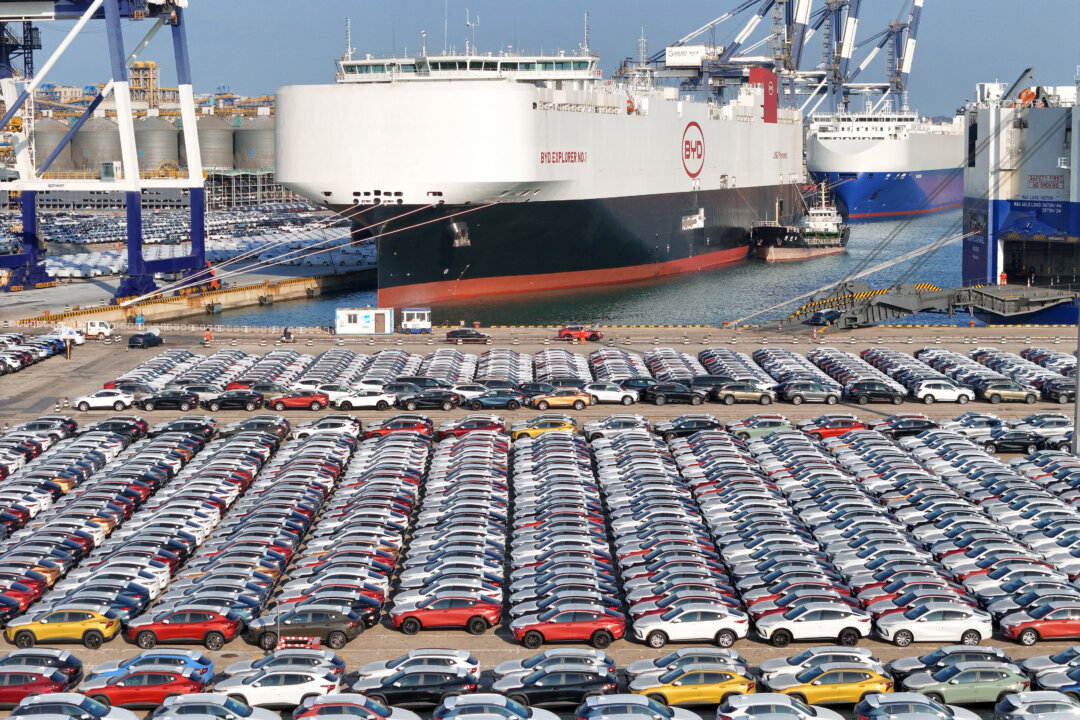


The United States should implement trade measures to prevent an influx of subsidized, cheap Chinese electric vehicles (EVs) from Mexico, which threatens the U.S. auto industry, an industry group has warned.
In a report titled “China’s Existential Threat to America’s Auto Industry and its Route Through Mexico,” released on Feb. 20, the Alliance for American Manufacturing expressed significant concerns that Chinese EV dominance could wipe out the century-long U.S. auto industry.
“The introduction of cheap Chinese autos–which are so inexpensive because they are backed with the power and funding of the Chinese government–to the American market could end up being an extinction-level event for the U.S. auto sector, whose centrality in the national economy is unimpeachable,” the group warned.
The warning comes amid reports that Chinese EV firms have heavily invested in Mexico in order to benefit from favorable tariffs under a trade agreement between Washington and its neighboring trading partner.
China’s biggest EV company, BYD, considered building a plant in Mexico to expand its business to North America, according to The Wall Street Journal. Other Chinese EV big names such as Cherry and SAIC Motors already intend to have plants in Mexico, Motor Trend reports.
The report pointed out that between 2017 and 2023, auto part imports from China to the United States dropped by 17 percent, while imports from Mexico increased by 20 percent for the same period, indicating that China-made car components started to bypass U.S. tariffs via the southern neighboring country.
The U.S. auto sector has not faced fierce competition from China-made EVs owing to the 25 percent tariff imposed since the Trump administration, which continued to be renewed during the Biden administration.
However, the group argues the United States should work to prevent automobiles and parts manufactured in Mexico, by companies headquartered in China, from benefiting from a North American free trade agreement. “The commercial backdoor left open to Chinese auto imports should be shut before it causes mass plant closures and job losses in the United States,” the report said.
The Chinese Communist Party (CCP) has been supporting its homegrown EV industry for years through enormous government subsidies and preferential policies. According to MIT Technology Review, from 2009 to 2022, the Chinese regime poured 29 billion dollars into its EV sector via subsidies and tax breaks.
As a result of significant subsidies, China’s EV exports have skyrocketed by 851 percent in the last three years, accounting for 60 percent of the global EV market. China has surpassed Japan to become the largest car exporter for the first six months of 2023, according to The New York Times.
The group calls on the Biden administration to issue policies to prevent this threat to the U.S. auto industry. “The United States must adopt a proactive and evolving strategy to stymie the CCP’s penetration. Washington should raise tariffs further on made-in-China vehicles, tighten and fully enforce the USMCA’s ROO [The United States-Mexico-Canada Agreement Rules of Origin] so they are not allowed to leak in, and exclude from the pact’s preferential treatment components and vehicles made by companies headquartered in non-market economies like China,” the group said.
‘No Time to Lose’
Earlier this year, Tesla CEO Elon Musk warned that “if there are no trade barriers established, they [Chinese EVs] will pretty much demolish most other car companies in the world.”In November, the House Select Committee on the CCP asked the Biden administration to consider increasing tariffs on Chinese cars and strengthening rules on countries of origin to prevent Chinese EVs from flooding the United States.
In Europe, China’s EVs enjoy a lower tariff of 10 percent and benefit from the EU’s green policy, which has opened up opportunities for them in the bloc. As a result, EU automakers are losing the EV competition in their own market, mainly to Chinese competitors.
In September, the European Commission officially began to open an anti-subsidy probe into Chinese EVs. European Commission President Ursula von der Leyen said at the time that “global markets are now flooded with cheaper Chinese electric cars. And their price is kept artificially low by huge state subsidies.”
The Alliance for American Manufacturing warned that the threat posed to the American auto industry by “heavily subsidized Chinese imports is significant, and the level of its severity will depend greatly on how federal policymakers respond to it.”
The group said that a “dedicated and concerted effort to turn those imports back requires greatly strengthened trade enforcement and fully implementing existing domestic industrial policies. This effort should be undertaken immediately, there is no time to lose.”
Reuters contributed to this report.


